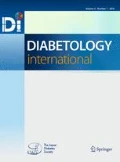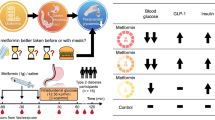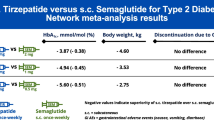Abstract
We analyzed data on treatment satisfaction of patients with type 2 diabetes mellitus (T2DM) treated with one oral hypoglycemic agent (OHA) and examined characteristics of the patients grouped by 5 classes of OHAs, i.e., sulfonylurea (SU), biguanide (BG), α-glucosidase inhibitor (αGI), thiazolidine insulin sensitizer (TZD), and dipeptidyl peptidase IV (DPP-4) inhibitor. Treatment satisfaction was assessed by the Oral Hypoglycemic Agent Questionnaire (OHA-Q) and Diabetes Treatment Satisfaction Questionnaire (DTSQ). Out of 597 enrolled patients, we excluded 73 and included 524 (SU 107, BG 120, αGI 99, TZD 99, DPP-4 inhibitor 99) for statistical analyses. There were some significant between-group differences in background factors, such as age, duration of diabetes mellitus, body mass index (BMI), etc. After adjusting the factors using a multivariate model, there was a significant between-group difference only in treatment convenience out of three OHA-Q subscale scores. Relatively low treatment convenience was reported in the BG and αGI groups. Out of 20 OHA-Q item scores, there were significant between-group differences in six items, and the result was consistent with known side effects of each drug class, i.e., bodily swelling in the TZD group, hypoglycemia in the SU group, etc. Meanwhile, with regard to DTSQ, there was a significant between-group difference only in the hypoglycemia subscale out of the three subscales. These results showed the possibility of the treatment satisfaction scale to characterize OHAs from the patient’s standpoint. Therefore, treatment satisfaction scales, such as the OHA-Q, are expected to help each T2DM patient to choose the best OHA (or combination of OHAs) according to his/her condition and preference.





Similar content being viewed by others
References
Krentz AJ, Bailey C. Oral antidiabetic agents: current role in type 2 diabetes mellitus. Drugs. 2005;65(3):385–411.
Krentz AJ, Patel MB, Bailey C. New drugs for type 2 diabetes mellitus: what is their place in therapy? Drugs. 2008;68(15):2131–62.
The Japan Diabetes Society. Treatment Guide for Diabetes 2012–2013, Tokyo.
Bolen S, Feldman L, Vassy J, et al. Systemic review: comparative effectiveness and safety of oral medications for type 2 diabetes mellitus. Ann Intern Med. 2007;147:386–99.
Selvin E, Bolen S, Yeh HC, et al. Cardiovascular outcomes in trials of oral diabetes medications. Arch Intern Med. 2008;168(19):2070–80.
Inzucchi SE, Bergenstal RM, Buse JB, et al. Management of hyperglycemia in type 2 diabetes: a patient-centered approach: position statement of the American Diabetes Association (ADA) and European Association for the Study of Diabetes (EASD). Diabetes Care. 2012;35(6):1364–79.
The Japan Diabetes Society. The Evidence-based Practice Guideline for the Treatment of Diabetes in Japan 2010, Tokyo.
Patrick DL, Burke LB, Powers JH, et al. Patient-reported outcomes to support medical product labeling claims: FDA perspective. Value Health. 2007;10(Suppl 2):S125–37.
The DCCT research group. Reliability and validity of a diabetes quality-of-life measure for the diabetes control and complications trial (DCCT). Diabetes Care. 1988;11(9):725–32.
Bradley C. Diabetes treatment satisfaction questionnaire (DTSQ). In: Bradley C (ed) Handbook of psychology and diabetes. Harwood Academic Publ., Chur, 1994.
Ishii H, Bradley C, Riazi A, Barendse S, Yamamoto T. The Japanese Version of the Diabetes Treatment Satisfaction Questionnaire (DTSQ): translation and clinical evaluation. J Clin Exp Med. 2000;192:809–14.
Polonsky WH, et al. Assessment of diabetes-related distress. Diabetes Care. 1995;18(6):754–60.
Ishii H, Yamamoto T, Ohashi Y. Development of insulin therapy related quality of life measure (ITR-QOL). J Japan Diabetes Soc. 2001;44:9–14.
Ishii H, Anderson JH Jr, Yamamura A, et al. Improvement of glycemic control and quality-of-life by insulin lispro therapy: assessing benefits by ITR-QOL questionnaires. Diabetes Res Clin Pract. 2008;81(2):169–78.
Donatti C, Wild D, Horblyuk R, et al. Psychometric evaluation of the Satisfaction with Oral Anti-Diabetic Agent Scale (SOADAS). Diabetes Res Clin Pract. 2008;80(1):108–13.
Ishii H, Oda E. Reproducibility and validity of a satisfaction questionnaire on hypoglycemic agents: Oral Hypoglycemic Agent Questionnaire (OHA-Q). Diabetol Int. 2012;3(3):152–63.
Acknowledgments
This study was supported by a research grant from The Waksman Foundation of Japan, Inc.
Conflict of interest
Hitoshi Ishii has received speaking honoraria from Novo Nordisk, Sanofi, Eli Lilly, Novartis, Takeda, and Merck Sharp and Dohme; Eisei Oda has no conflict of interest.
Author information
Authors and Affiliations
Corresponding author
About this article
Cite this article
Ishii, H., Oda, E. Characteristics of patients with type 2 diabetes mellitus grouped by 5 classes of oral hypoglycemic agents based on assessment of treatment satisfaction. Diabetol Int 5, 134–143 (2014). https://doi.org/10.1007/s13340-013-0149-4
Received:
Accepted:
Published:
Issue Date:
DOI: https://doi.org/10.1007/s13340-013-0149-4




